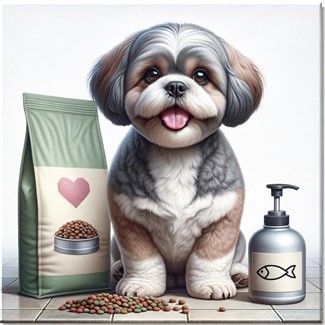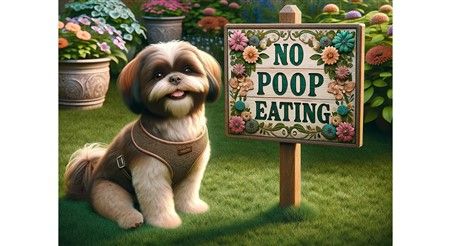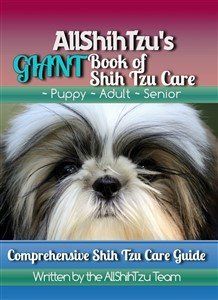Shih Tzu Coprophagia (Eating Feces)
Overview
Coprophagia, is a common yet often distressing behavior where dogs, including the Shih Tzu, consume feces, be it their own or that of other animals. It is a prevalent issue among canines and understandably causes concern for many pet parents.
In this article, we cover the causes of coprophagia, associated health risks, and discuss when to seek a vet's assessment. We also provide practical advice on treating, managing, and preventing this behavior, ensuring you have the knowledge and tools to support your Shih Tzu’s well-being.
Please note: AllShihTzu is reader-supported, and some of the product suggestions on this page are affiliate links. As an Amazon Associate we earn from qualifying purchases. This is at no extra cost to you and helps keep this site running.
Causes of Coprophagia with Shih Tzu Dogs
The issue of a Shih Tzu, or any other dog, eating poop is tricky to resolve since there are quite a few possible causes behind the behavior and coprophagia may develop from more than one trigger. This said, it is a behavior that should be addressed and there are ways to prevent it. First, let's take a look at the top possible reasons.
Medical Reasons
- Enzyme Deficiencies: Shih Tzu dogs lacking certain digestive enzymes may turn to coprophagia. This deficiency can lead them to seek out enzymes from other animals' feces, as a compensatory behavior for what their bodies are missing.
- Parasites: Internal parasites like roundworms, hookworms or whipworms can rob a dog of essential nutrients, leading them to consume feces as a misguided attempt to restore these nutrients.
- Diseases Affecting Absorption of Nutrients: Conditions like exocrine pancreatic insufficiency, inflammatory bowel disease, intestinal tumors or cancer, can impair a dog’s ability to absorb nutrients, potentially leading to coprophagia as the dog instinctively tries to compensate for these deficiencies.
- Other Health Conditions, not directly related to nutrient absorption or enzyme deficiencies, may also lead to coprophagia. These can include neurological disorders or cognitive dysfunction in older dogs.
Behavioral Reasons
- Boredom, Anxiety or Stress: Shih Tzu dogs that are not mentally or physically stimulated may eat feces out of boredom or anxiety. This behavior can be a sign that the dog needs more interactive play, exercise, or mental challenges.
- Attention-Seeking Behavior: Some dogs learn that eating feces garners a strong reaction from their humans and may continue the behavior to gain attention, even if it is negative.
- Imitation of Mother’s Behavior During Weaning: Young puppies may mimic their mother's behavior of eating feces (which mothers do to keep the den clean). This learned behavior can sometimes persist even as the pup matures.
- Curiosity, Especially in Puppies: Young dogs often explore the world with their mouths and might eat feces out of curiosity.
Diet-Related Reasons
- Poor Quality of Food: If a dog's diet lacks sufficient nutrients or is hard to digest, they might eat feces as an instinctual attempt to make up for these dietary shortcomings.
- Insufficient Nutrients: Even well-balanced diets can fall short in certain nutrients for some dogs. This insufficiency may drive them to eat feces, seeking missing nutrients like vitamins or minerals.
Health Risks Associated with Coprophagia
Transmission of Parasites and Diseases: Consuming feces can expose a Shih Tzu to various parasites like roundworms, hookworms, and giardia, as well as bacterial infections such as salmonella and E. coli. These parasites and pathogens are often present in feces and can lead to serious health issues in dogs.
Potential for Zoonotic Infections: Less common, but still possible, are zoonotic infections, where pathogens in feces are transmitted from animals to humans. Eating poop can turn dogs into inadvertent carriers, posing dangers to humans, particularly young children and the immunocompromised. These types of infections include salmonellosis, campylobacteriosis, giardiasis and hookworms and roundworms, which are especially risky for children.
Nutritional Imbalances: Regular consumption of feces can lead to nutritional imbalances with Shih Tzu dogs. It can disrupt the normal balance of nutrients in their diet, potentially leading to deficiencies or excesses of certain nutrients, which can impact overall health and well-being.
How to Prevent and Treat Coprophagia with Shih Tzu Puppies and Dogs

Taking steps to stop a Shih Tzu from eating poop is a multifaceted process that requires a comprehensive approach. There's no single solution to this complex behavior, but with patience and persistence, it is possible to effectively address and potentially stop it.
Successful treatment often involves a combination of medical interventions, behavioral modifications, and home-based strategies. Each Shih Tzu is unique, and what works for one may not work for another, calling for a tailored approach that considers the individual dog's health, environment, and behavioral patterns.
Here’s a detailed guide on how to approach this challenge:
#1 Enzyme Supplements
These types of supplements can aid in digestion and nutrient absorption, reducing a dog's tendency to seek out feces. Other benefits include improved coat texture, reduced dry skin and flatulence, healthier weight, and increased energy. One like NaturVet Advanced Probiotics and Enzyme Powder
can be mixed with a meal once daily. Noticeable improvements may appear in a week, with optimal results in one to two months. This is safe for long-term use, but may be less necessary in time.
#2 Parasite Control
To rule out worms as a cause of coprophagia, puppies should be checked for parasites every 2–4 weeks until about four months old due to higher risk. Adults typically need exams once or twice a year, though those with high exposure (like frequent dog parks or trails) may need more. Shih Tzus on parasite prevention often need fewer checks but should still have annual exams. If there’s a history of infections, the vet may recommend more frequent monitoring. monitoring might be advised by the vet.
#3 Adjust the Diet
Ensure a balanced diet that meets all your Shih Tzu’s nutritional needs, as this can reduce coprophagia behavior if the diet is missing key nutrients. See also: Shih Tzu Feeding Guidelines.
Adding either pineapple and pumpkin to a dog’s diet is said to perhaps help with coprophagia; however, there is only anecdotal proof. Both are safe for dogs to eat in reasonable amounts. Pumpkin does work to help with digestive issues including diarrhea and constipation. But it will not affect the taste of feces.
#4 Limit Access
A Shih Tzu cannot eat feces that is not there. Maintain a clean poop-free yard. If you have a cat, and your Shih Tzu eats the cat poop, keep the litter box up high and out of reach. Any accidents in the house should be cleaned asap.
#5 Manage and Redirect Behavior
Keep a close eye on your Shih Tzu when outside. When on walks, keep them on a harness and a short leash, walking in a heeling position to your left and no further ahead then the extension of your foot. Do not allow them to sniff at poop or put their face anywhere near it.
Your yard should not contain any feces (see previous tip), but if it does, supervise your Shih Tzu and if they attempt to eat feces, interrupt them with a loud clap and a “no.”
#6 Positive Reinforcement Training
If there is an instance of your Shih Tzu seeing feces that they’d normally eat, but they do not, even if it was due to you controlling their movements via a harness and leash, immediately offer praise and reward. Use a high-value treat (a moist, strongly flavored, strongly desired treat that a dog does not receive at any other time other than to reinforce good behavior).
#7 Take Steps to Prevent Boredom
If your Shih Tzu eats their own poop when home alone, reassess their toy collection. If they require it, obtain some fun toys to combat boredom while you are away. When you are with your Shih Tzu, get them moving more with walks and games like fetch and have them engage in some mind exercises as well via puzzle game toys. See also: The Best Toys for a Shih Tzu for fun ideas.
#8 Take Steps to Prevent Stress
If your Shih Tzu eats their own poop when home by themselves, this may be due to separation anxiety stress. There are many ways to manage this including calming music, leaving on the TV tuned to a dog-friendly channel, experimenting with a window vs a non-window view and supplying a companion toy.
#9 Taste-Aversion Products
There are many types, some do not work at all and others are hit-or-miss. Do note that using hot sauce is not recommended. One supplement you may want to consider is No Poo Chews for Dogs by Vet Promise.
It’s an interesting supplement that works on the issue from many angles. It promotes healthy digestion via bromelain and pumpkin, it is formulated to reduce stool odor via glutamic acid (an amino acid) and has probiotics for good gut health. It's made in the USA and contains only all-natural ingredients. If nothing else, it can support healthier stools.
A Final Note
More Articles for You:
How to Make Your Shih Tzu Smell Amazing - These top coat sprays do more than freshen up, they leave your Shih Tzu silky, shiny, and smelling downright delightful. Packed with gentle ingredients and long-lasting scents, they’re a must-have for any grooming routine.
Best Interactive Toys to Keep Your Shih Tzu Busy - If you're looking for some great toys to help teach independent play or some ways for your sweetie to stay occupied when your focus is elsewhere, you'll love these finds.
Shih Tzu Dental Care - Oral health is at the top of concern for the Shih Tzu breed and all pet parents should be actively cleaning their Shih Tzu's teeth. See our top tips to keep your little guy or gal's teeth clean, to prevent infections and future tooth loss.
Are You Receiving our Newsletters?



